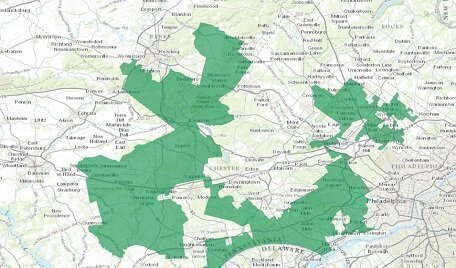On Thursday, Pennsylvania’s Supreme Court said it would expedite hearings in a potentially major gerrymandering case with broader implications.
 The case in the commonwealth’s court is from a group challenging to 2011 redistricting maps, and it wants new maps drawn before the 2018 election, which involves federal and state offices. Pennsylvania’s Republican leaders are opposing the move.
The case in the commonwealth’s court is from a group challenging to 2011 redistricting maps, and it wants new maps drawn before the 2018 election, which involves federal and state offices. Pennsylvania’s Republican leaders are opposing the move.
At the same time, there is a similar case about Pennsylvania redistricting in the federal court system, and the United States Supreme Court is considering a possible landmark gerrymandering decision from Wisconsin in Gill v. Whitford.
The Pennsylvania state-court case centers on partisan gerrymandering allegedly so biased that it denied Democrats meaningful votes in federal elections. Gerrymandering opponents also claim the district maps violate state constitutional clauses about free speech, political association, and equal protection. In three elections using the district maps, Republicans won about 72 percent of the state’s House of Representatives seats while winning only 54 or 55 percent of votes in House races statewide.
Earlier this week, Constitution Daily contributor Lyle Denniston explained the uniqueness of the Pennsylvania court case.
“The state court case appears unlikely to be affected directly by what the Supreme Court decides, because the state lawsuit is based entirely on provisions of Pennsylvania’s constitution, on which state courts have the last word, while the Gill case will turn entirely on the federal Constitution,” Denniston said.
“Moreover, Pennsylvania’s Supreme Court has already ruled – in a 2002 decision – that partisan gerrymandering challenges can be pursued in state courts. That option so far is denied to challengers who take their cases to federal courts, but that is now at issue in the Wisconsin case,” he added.
The United States Supreme Court case involves a major Wisconsin dispute testing the constitutionality of partisan gerrymandering. The Supreme Court has never struck down districting maps on a partisan basis due to the lack of a formula to determine excess partisanship.
Earlier this week, a federal panel in Pennsylvania ruled that a parallel lawsuit about Pennsylvania gerrymandering could move forward. The judges gave no explanation for their ruling, but said they would give their reasons in a later opinion. The judges said the parties could pursue their claim based on the Constitution's Elections Clause, and the "privileges and immunities" guarantee under the Fourteenth Amendment.
For the time being, it also dismissed the claim that the 2011 maps violated the First Amendment rights of the Democratic challengers, but gave them the chance to amend They also allowed the challengers to add new voters to the case from each of the state's 18 districts.







